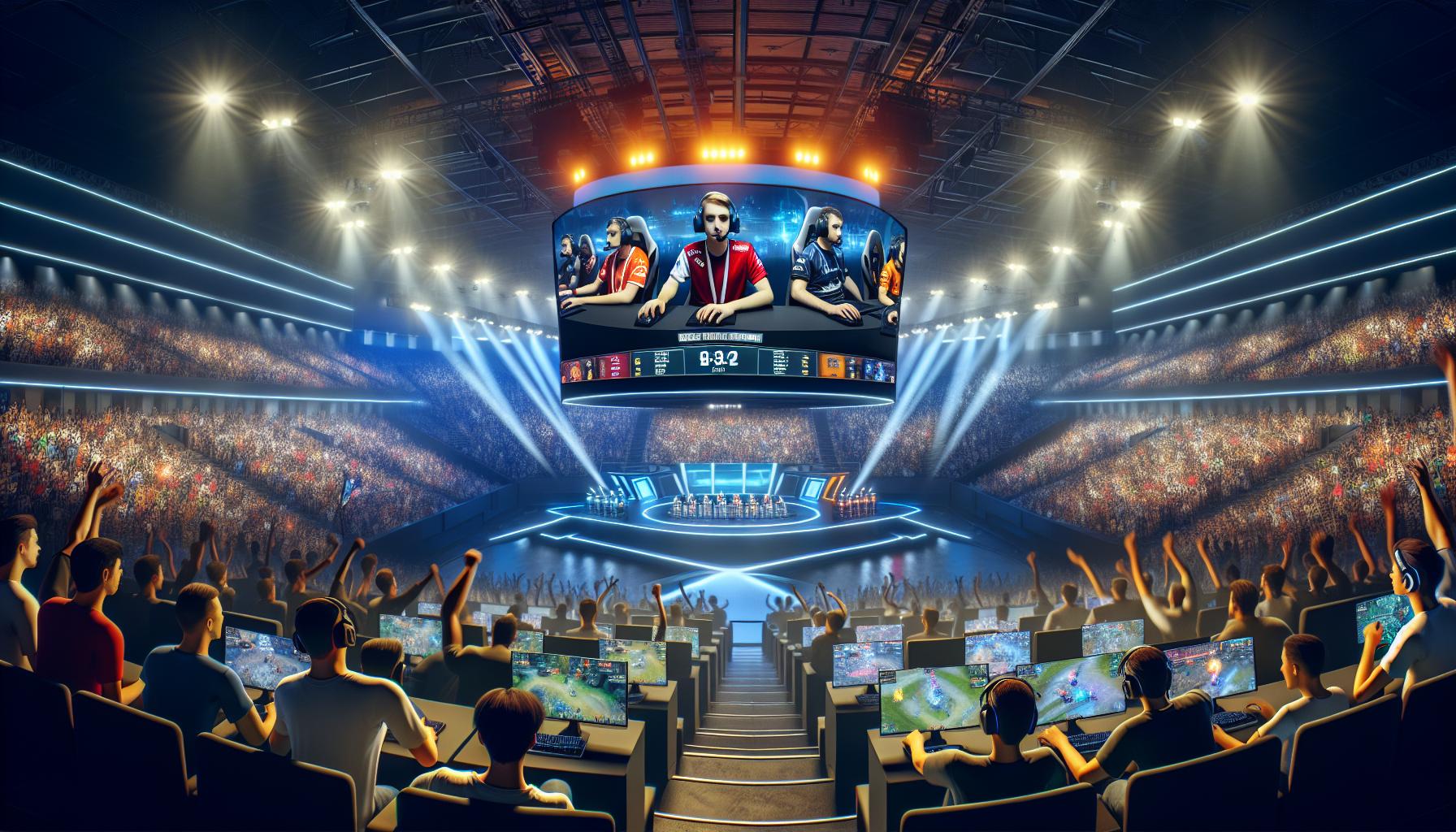Key Takeaways
- Explosive Growth: Esports has evolved into a global phenomenon, attracting over 500 million viewers and generating a market valuation of approximately $1.08 billion in 2021, with projections exceeding $1.62 billion by 2024.
- Top Competitions: Major esports events, such as The International for Dota 2 and the League of Legends World Championship, offer extraordinary prize pools, sometimes exceeding $40 million, highlighting the competitive nature and financial stakes involved.
- Diverse Game Titles: Popular esports games like League of Legends, Dota 2, and Counter-Strike: Global Offensive not only dominate viewership but also maintain robust competitive scenes, engaging millions of participants worldwide.
- Audience Demographics: The majority of esports viewers are aged 18-34, with an increasing representation of female participants, which underscores the growing inclusivity and appeal of esports.
- Sponsorship Power: Major brands like Intel and Red Bull are investing heavily in the esports ecosystem, recognizing its potential to engage the younger demographic, enhancing production values and event visibility.
- Cultural Impact: Esports significantly influences youth culture, fostering community and teamwork while blurring the lines with traditional sports through partnerships and hybrid events that attract extensive audiences.
Esports has rapidly transformed from a niche hobby into a global phenomenon, captivating millions of fans and players alike. With its explosive growth, understanding the dynamics of this competitive gaming landscape becomes essential. From record-breaking tournaments to professional players earning millions, esports is reshaping the way we view sports and entertainment.
As the industry evolves, a wealth of fascinating facts emerges that highlight its significance. These insights not only showcase the incredible scale of esports but also reveal the dedication and skill that players invest in their craft. Whether you’re a seasoned gamer or new to the scene, exploring these esports facts will deepen your appreciation for this thrilling world.
Esports Facts
Esports refers to organized, competitive video game events. These events attract millions of viewers and participants globally, showcasing a variety of games ranging from multiplayer online battle arenas (MOBAs) to first-person shooters (FPS).
Key Statistics
- Audience Size: In 2021, esports attracted over 500 million viewers worldwide. This number continues to rise as gaming becomes increasingly mainstream.
- Market Revenue: The global esports market was valued at approximately $1.08 billion in 2021, with projections expecting it to exceed $1.62 billion by 2024.
- Professional Players: Top esports athletes can earn substantial incomes. Players like Tyler “Ninja” Blevins have generated annual earnings exceeding $20 million from tournament winnings, sponsorships, and streaming.
Major Tournaments and Events
- The International (TI): The International is the premier annual tournament for Dota 2, offering prize pools that surpass $40 million.
- League of Legends World Championship: This championship sees over 100 teams compete for a prize pool often exceeding $10 million.
- CS:GO Major Championships: These championships offer substantial cash prizes, with the most recent tournaments featuring pools amounting to $2 million.
Popular Esports Titles
- League of Legends: A leading title in competitive gaming with millions of active players and viewers.
- Dota 2: Renowned for its high-stakes tournaments and dedicated fanbase.
- Counter-Strike: Global Offensive (CS:GO): A staple in the FPS category, known for its competitive scene and tactical gameplay.
Escalating Popularity
Factors contributing to the growth of esports include improved internet infrastructure, increased accessibility to gaming equipment, and the rise of streaming platforms like Twitch and YouTube Gaming. These platforms facilitate real-time interaction, enabling fans to engage with their favorite players and teams directly.
Esports also influences traditional sports, with several professional teams establishing their own esports divisions, recognizing the potential for marketing and fan engagement.
Sponsorship and Investment
Sponsorships play a crucial role in the financial ecosystem of esports. Major companies like Intel and Red Bull invest in teams and events to enhance visibility. This influx of capital drives innovation and facilitates better production values for tournaments, which further captivates audiences.
This overview encapsulates the dynamic and rapidly evolving landscape of esports, emphasizing its significance in the worlds of sports and entertainment.
Popular Esports Titles

Esports features a diverse range of games that captivate audiences globally. Popular titles dominate the competitive scene, while emerging games capture new audiences.
Major Titles to Watch
- League of Legends: This multiplayer online battle arena (MOBA) game remains a frontrunner. The annual League of Legends World Championship offers prize pools often exceeding $5 million, attracting millions of viewers.
- Dota 2: Known for its complexity and strategic depth, Dota 2 hosts The International tournament, which regularly boasts prize pools surpassing $30 million, marking it as a pinnacle event in esports.
- Counter-Strike: Global Offensive (CS:GO): This first-person shooter (FPS) has a vibrant competitive scene with numerous tournaments, including CS:GO Major Championships, which feature prize pools reaching $2 million.
- Fortnite: This battle royale game gained immense popularity for its unique building mechanics. The Fortnite World Cup offers substantial prize funds, drawing significant participation and viewership.
- Call of Duty: Known for its fast-paced gameplay, the Call of Duty League offers a competitive structure with substantial team and player investments, appealing to FPS enthusiasts.
- Valorant: Released in 2020, this tactical hero shooter quickly gained traction. The competitive Valorant scene leverages frequent tournaments with growing prize pools and dedicated followings.
- Apex Legends: This battle royale game combines character abilities with strategic gameplay. The Apex Legends Global Series has established a vibrant competitive scene, drawing new players and viewers alike.
- Rocket League: This unique game blends soccer with rocket-powered cars. The Rocket League Championship Series has seen increasing viewership, highlighting its appeal.
- Super Smash Bros. Ultimate: This platform fighter game features beloved characters from various franchises. The competitive community thrives on grassroots tournaments, fostering a cult following.
- Magic: The Gathering Arena: This digital collectible card game is witnessing a resurgence in esports. The Magic World Championship offers competitive play, attracting card game enthusiasts.
These titles reflect the evolving landscape of esports, where established games coexist with newcomers, engaging a wide array of participants and fans.
Esports Demographics

Esports demographics reveal crucial insights into the audience and player base. Understanding these statistics aids in grasping the rapid expansion and diversity in esports participation.
Age and Gender Statistics
Age statistics show that esports participants and audiences predominantly belong to the 18-34 age group, comprising approximately 40% of the total viewership. This cohort is often targeted by sponsors due to its purchasing power. Gender statistics indicate a notable shift; about 30% of esports viewers identify as female, showcasing increased inclusivity in a traditionally male-dominated space. Platforms and events that prioritize diversity tend to attract broader audiences and engagement.
Regional Popularity Trends
Regional trends highlight varying interest levels in esports across the globe. In North America and Europe, popular titles like League of Legends and Call of Duty dominate viewership, while Asia-Pacific regions favor games such as Dota 2 and PUBG. In 2022, Asia accounted for 47% of global esports revenue, showcasing its tremendous market potential. Latin America is emerging rapidly, with engagement rates increasing among younger audiences, driven by local tournaments and international exposure. Understanding these regional dynamics informs effective marketing strategies and enhances audience targeting for esports organizations.
Impact of Esports on Culture

Esports significantly influences modern culture, shaping social interactions, entertainment, and even the perception of technology. Its reach extends beyond gaming enthusiasts, impacting various demographics and cultural norms.
Influence on Youth
Esports captivates young audiences, providing an engaging outlet for competition and creativity. Approximately 70% of esports viewers are under the age of 34, contributing to a gaming culture that fosters community and teamwork. Participating in esports promotes skills such as strategic thinking, hand-eye coordination, and communication. Many educational institutions integrate esports programs, recognizing their potential in developing teamwork and critical thinking abilities. For instance, over 200 colleges in North America offer scholarships for esports athletes.
Relations with Traditional Sports
Esports continues to blur the lines between digital gaming and traditional sports. Major sports franchises, including the NBA and NFL, invest in esports teams or host gaming leagues, aiming to reach younger fans. Hybrid events like the League of Legends Championship Series draw large audiences, similar to conventional sporting events. In 2021, the League of Legends World Championship attracted over 4 million peak viewers, highlighting its massive reach. Sponsorships from traditional sports entities enhance credibility and financial backing, bolstering the legitimacy of esports as a competitive platform. This convergence signifies the recognition of esports as a vital component of contemporary entertainment culture.
Economic Aspects of Esports
Esports represents a lucrative industry with multiple financial dimensions. Understanding its economic components reveals how diverse revenue streams and strategic partnerships contribute to the ecosystem.
Revenue Streams
Revenue in esports comes from various sources, significantly impacting its growth and sustainability. Key revenue streams include:
- Tournament Prize Pools: Major competitions often feature significant prize pools, with events like The International 2021 for Dota 2 reaching $40 million.
- Game Sales: Game developers earn income through the sale of games and downloadable content, impacting the esports scene directly.
- Merchandising: Teams generate revenue by selling branded merchandise, including apparel and gaming peripherals.
- Streaming Platforms: A substantial portion of income comes from platforms like Twitch, which pay streamers based on subscriptions and viewer donations. For instance, Twitch reportedly paid out over $250 million in 2020.
- Media Rights: Selling broadcasting rights to networks and online platforms creates substantial income, enhancing distribution and viewer access.
Sponsorship and Advertising
Sponsorship and advertising play a crucial role in the financial success of esports. Key aspects include:
- Major Brands: Companies like Intel, Red Bull, and Coca-Cola invest heavily, recognizing the potential to reach a young, engaged audience. Sponsorship investments in esports exceeded $1 billion in 2021.
- Team Sponsorships: Professional teams often partner with brands for jersey sponsorships, equipment endorsements, and event promotions. For example, Team Liquid’s partnerships with brands like Alienware and HyperX showcase the sponsorship landscape.
- In-Game Advertising: Advertisers utilize integrated marketing within games, promoting brands during live broadcasts or through game mechanics.
- Content Creation: Brands leverage content creation opportunities through collaborations with popular streamers and esports personalities, enhancing visibility and engagement.
These economic aspects illustrate the robust and dynamic landscape of esports, highlighting its significance in modern entertainment.
Esports Has Undeniably Carved Out a Prominent Place in Global Entertainment
Esports has undeniably carved out a prominent place in global entertainment. Its growth trajectory showcases not just the popularity of competitive gaming but also its cultural significance. As more viewers tune in and participants engage, the landscape continues to evolve, driven by technological advancements and shifting demographics.
The increasing involvement of traditional sports organizations and major brands highlights the potential for further expansion. With diverse titles captivating audiences and substantial financial opportunities for players, esports is set to remain a vital force in both gaming and the broader entertainment industry. The future looks bright for esports as it continues to redefine competition and community in the digital age.